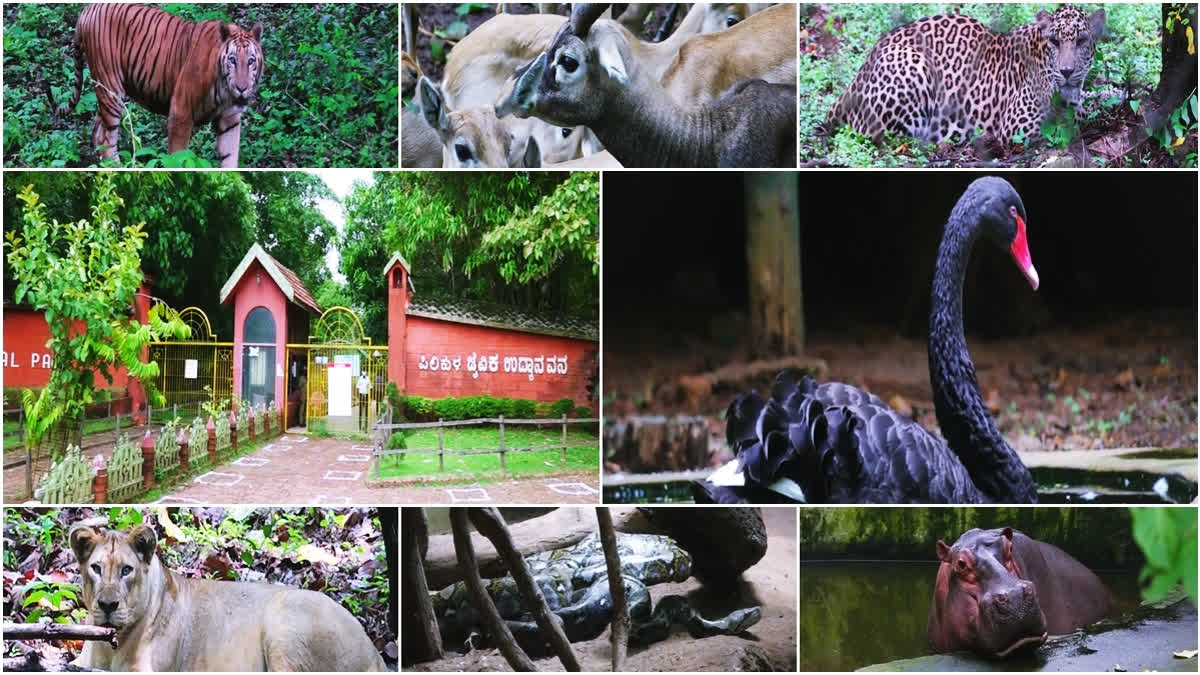Mangaluru (Karnataka) : One of the 17 largest zoos in the country, Mangalore's Pilikula Biological Park in Karnataka has achieved the distinction of being number 1 in breeding rare species. Spread over an area of 150 acres, this zoo has become famous for breeding rare tigers, wild dogs, King Cobras, and Riya birds.
There are 164 accredited zoos in our country out of which 17 are the largest zoos. Pilikula in Mangalore is one of them. Over 475 animals and birds have been bred in Pilikula Zoo so far. More than 15 tiger cubs have been born here till now. At present, there are 12 tigers here and the rest have been sent to other zoos including Chennai, Reliance, and Bannerghatta.
'Dol', an endangered species of wild dog brought from Visakhapatnam Zoo in Andhra Pradesh, has also been successfully bred at Pilikula. The breeding number of wild dogs here has crossed 30.
Also Read : 5 snow leopard cubs born at Padmaja Naidu Zoo in Darjeeling
For the first time in the country, the breeding of king cobra was done scientifically in Pilikula years ago. Over 180 king cobra offspring have been born here. At present, there are a total of 15 king cobras in Pilikula. More than 175 cobras have been released in the forest. More than 50 have been sent to other zoos.
The congenial climate here is the main reason for the active breeding of rare species. Pilikula is known for the conservation and breeding of endangered animals, and the special feature of this zoo is that animals and birds brought from other zoos are increasing their numbers here. The largest collection of snake species is in Pilikula.
About 1,440 animals and birds including tigers, lions, leopards, wild dogs, hyenas, jackals, hippos, crocodiles, turtles, birds, deer, blackbucks, mongoose, wild cats, grey wolves and squirrels are seen in this zoo.
Talking about this, Jayaprakash Bhandari, Director of Pilikula Zoo, said that there are 120 species of animals and birds in Pilikula Biological Park. Out of which, 40 animals and birds are endangered species. In our zoo, the breeding of tigers, leopards, and king cobras is happening in large numbers as compared to other zoos.
In that too the breeding of the king cobra is happening only to her. King cobra is breeding scientifically and there are already 180 cubs. Additional king cobras are released into the wild. The environment and caretaking in Pilikula are key to this reproductive development, he said.
Here we have created a forest environment. A balanced diet and medical treatment are provided as per requirement. A lot of precautions are taken for the rearing of the hatchlings. For example, if a tiger cub is born, its caretakers should go to their nest to keep it clean. A vaccine is given in the first month and a booster dose is given in the second month. Quarantine is observed as required. As a result of doing this, the highest breeding rate in the country is happening in Pilikula Zoo, Jayaprakash added.



